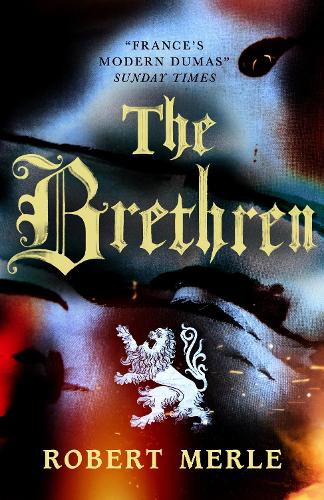
The Brethren: Fortunes of France 1
(Paperback)
Publishing Details
The Brethren: Fortunes of France 1
By (Author) Robert Merle
Translated by T. Jefferson Kline
Translated by T. Jefferson Kline
1
Pushkin Press
Pushkin Press
27th June 2018
United Kingdom
Classifications
General
Fiction
843.914
Physical Properties
Paperback
416
Width 129mm, Height 198mm
Description
The Perigord of sixteenth-century France is a wild region on the edge of the reaches of royal authority-its steep, forested valleys roamed by bands of brigands and gypsies are divided by conflict between Catholics and converts to the new Protestant faith, the Huguenots.
To this beautiful but dangerous country come two veterans of the French king's wars, Jean de Siorac and Jean de Sauveterre, The Brethren-as fiercely loyal to the crown as they are to their Huguenot religion. They make their home in the formidable chateau of Mespech, and the community they found prospers, but they are far from secure-religious civil war looms on the horizon, famine and plague stalk the land, and The Brethren must use all their wits to protect those they love from the chaos that threatens to sweep them away.
The Brethren is the first volume in the epic historical drama Fortunes of France - a lusty, exhilarating blend of adventure and romance set against the backdrop of a critical period in European history.
Reviews
"There is a philosophical depth to the novel. . . one of the strengths of Merles novels [is] his ability to evoke the feeling and texture of everyday life as well as high politics. . . [The Brethren]has a credibly human solidity, and whets ones appetite for the next volume, City of Wisdom and Blood, which will be published in the fall." The Wall Street Journal
"One of the many delights vouchsafed by Robert Merle's The Brethren is the sense that the author is astonished that what he's writing about actually happened. . . If there is a pattern to the narrationa dependable vacillation between personal exploit and public machinationthe chronicle is also seductively contorted, with adventures sowed into other adventures. . . Pierre, then, is the human demilitarized zone separating his mother and father. His voice can be self-congratulatory though also generous and gently philosophical, reminiscent at moments of Merle's colleague Sartre. . . Feudal life can hardly seem more vivid than when Merle leaves the religious war to describe, through a smart translation by T. Jefferson Kline, a soul-strengthening day of haymaking or the swagger of a barrel-chested wet nurse with 'milk for sale.' Merle the English teacher repeatedly bows to Shakespeare. . . [The Brethren] is wise and audacious, constantly nudging up against the extraordinary." The New York Times Book Review
"Thecompellingfirst in a series of French historical novels,deftly translatedand published for the first time in English. Chteau Mespech is a fiefdom relentlessly imperiled by the weather, Gypsy bandits, royal and religious duplicity, and the plague. . .Merle peoples his tale with memorable characters: villains, maids, legionnaires and townsfolk . . .Merle's is a French epic, more genteel than Dickens' poor-child English tales and less doleful than Tolstoy's Russian sagas." -- Kirkus Reviews
"A vivid novel by France's modern Dumas... [there is] plenty of evidence in the rich characterisation and vivid historical detail that a reader's long-term commitment will be amply rewarded." Sunday Times
"Cleverly depicts Frances epic religious wars through the intimate prism of one familys experience. Its beautifully written too."Metro.
"We're swept away by triumph, tragedy, action and adventureIt's a novel like this that makes reviewing one of the best jobs in the world." The Book Bag, Five Star Review
Historical fiction at its very best The second instalment cannot be published too soon. We Love This Book
A Sprawling, earthy tale of peril, love, lust, death, dazzling philosophical debate and political intrigue an engrossing saga. Gransnet
"A master of the historical novel." Guardian
"A spectacular evocation of sixteenth- and seventeenth-century France." Independent
Advance Praise from Europe:
"His readers appreciate his recipe for writing that is as political as it is entertaining." Deutschlandfunk
"Be warned: even just a few pages can lead to addiction." Neckar-Tauber Trend
"With much wit, irony and a knack for juicy details, [Merle] brings alive his country's history." Literatur-Report
"For fans of historical fiction, The Brethren is a delight to savour." Thringer Allgemeine
"Thrilling! Robert Merle rides his novel at full tilt across a richly eventful period of history." Le Magazine Littraire
"Robert Merle is one of the very few French writers who have attained both popular success and the admiration of critics." Le Figaro
"A wonderful, colourful, breathlessly narrated historical panorama." Zeitpunkt
"Breathes new life into the classic adventure story and great historical epic." Les Nouvelles Littraires
"France's greatest popular novelist." Le Monde
"The Dumas of the twentieth century." Neues Deutschland
Author Bio
Robert Merle (1908-2004) was born in French Algeria, before moving to mainland France in 1918. Originally an English teacher, Merle served as an interpreter with British Expeditionary Force during the Second World War, and was captured by the German army at Dunkirk, the experience of which served as the basis for his Goncourt-prize-winning Weekend at Zuydcoote. He published the 13 volumes of his hugely popular Fortunes of France series over four decades, from 1977 to 2003, the final volume appearing just a year before his death in 2004.
